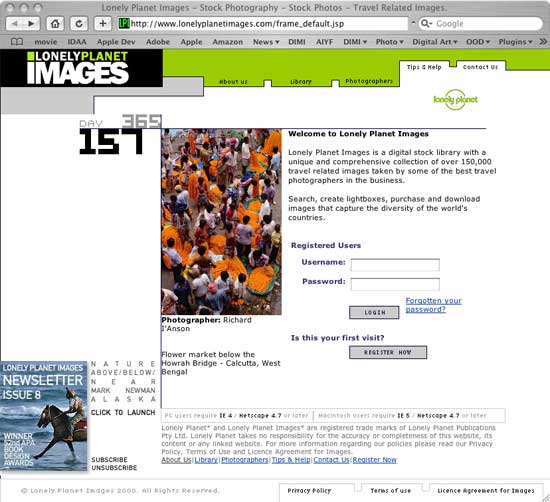Lonely Planet Images is a right’s preserved photo stock library.
Stock agencies, as opposed to royalty free CD companies, sell
individual images. The price often depends on end use. Most provide
both on-line image search facilities and the ability to phone someone,
describe the sort of shot you are after and have them do the searching
for you.

Lonely Planet Images
Anyone who travels knows of Lonely Planet, the company that makes some
of the best travel information guides around. Lonely Planet
itself, in its publications, uses about 10,000 images a year. Initially
serving in-house use predominantly, Lonely Planet Images is a full
service stock photography agency with 23 employees and offices in three
countries: Melbourne, London and San Francisco.
LPI is what is often called a niche or boutique stock agency. It only
covers travel images, though naturally these end up including a fair
bit of lifestyle content as well. LPI currently has over 150,000 images
available for on-line ordering and download. It is adding around 600 to
800 images a week and represents over 400 photographers, the largest
group of which is Americans. Interestingly, only 25% of these
photographers work full time on travel. For the rest it is only part of
what they do. 
LPI is fairly typical of most stock agencies in what photographers must
do to be represented. An initial contact has a set of guidelines sent
to the photographer who must them submit 500 original slides, with a
minimum of 50 from any country. If 10% or more of the images are
accepted, the photographer will then be offered a five-year contract.
LPI only requires image exclusivity, meaning the particular images they
accept can’t be used elsewhere. Most photographers will have other work
with one or more other stock agencies. LPI is usually approached by one
new photographer a week, with only about one in twenty being accepted
now. This is because they have so many good images now that the quality
bar is constantly rising. LPI pays a flat 50% commission on sales,
irrespective of which sales office makes the sale. This is better than
many of the bigger players.
 LPI
LPI
works hard with its photographers to help them supply the sorts of
images that will sell. Regular newsletters to the photographers inform
them of the currently heavily needed topics and shot lists of exactly
what sorts of shots to supply. Being a small stock library it still has
the personal touch with its photographers, something that many stock
photographers complain is missing from the larger agencies. Because LPI
mainly supplies images for editorial use, where model releases of
people in the images is not required, LPI do not insist that all images
be model released. However, they do encourage it where possible,
because of growing advertising use of their library.
Clients can order images off the web site that has full e-commerce
facilities. It has good on-line search facilities and LPI puts a lot of
effort into noting keywords for images to make them easy to find.
Interestingly around 50% of clients still prefer to ring and speak to a
person. This seems to be partly because people are so busy these days
and partly so they can negotiate on price.
Lonely Planet Images is an excellent stock library, both for the photographers and for the image users. It can be found at www.lonelyplanetimages.com.
Images in this article kindly supplied by LPI to the author for use in this article. All rights reserved by LPI.